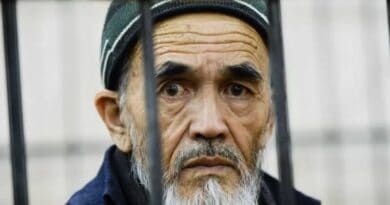Uzbekistan: authorities conceal the facts about deaths from COVID-19
The Association for Human Rights in Central Asia (AHRCA) conducted a study on the number of deaths during the pandemic. Using open data and its own information, the organization has concluded that the official death rates looks underestimated.
On December 15, the Ministry of Health of Uzbekistan reported 612 deaths from COVID-19. On the same day, on the Telegram channel Fidokorlar (“Selfless”), a message was published about 520 medics who had died from coronavirus. The Ministry of Health of Uzbekistan didn’t comment on the information concerning the number of doctors who had died.
In the message from the Ministry of Health dated November 17, 2020, the officials explained that 2,123 patients were receiving treatment for coronavirus. However, on the same day, the Department published other information – the number of infected was 6,570 people, including “patients with acute respiratory diseases, with suspected COVID-19 and severe cases of pneumonia, as well as patients with unconfirmed coronavirus”.
The explanation of the Ministry of Health appeared after the online edition Gazeta.uz and bloggers doubted the reliability of statistics on coronavirus and drew attention to the rapid pace of the disease.
The Ministry’s excuses raised even more questions, with heated discussions on social media, especially about the suppression of deaths of patients, who were receiving oxygen support, as a result of cutoff at the infectious diseases hospital of Zangiata. The Ministry of Health and the Regional Electric Networks JSC have denied the deaths due to power outages in this hospital. The official information again caused great doubt among social media activists and in the media.
The publication of Gazeta.uz was immediately followed by the Agency of Information and Mass Communications. In the letter dated November 20, signed by the Director of AIMC Asadzhon Khodjaev, the Department warned the publication about “serious legal consequences” for publishing unverified information in the future.
The Agency’s letter claims that the publication of information based on unverified data and expressed, in this regard, the attitude “led to the formation of a wrong opinion among the public”.
Further, AIMC notes: “This, in turn, may cause negative opinions and judgments regarding the actions of the country’s government taken in this direction” (comment: it was underlined by the Agency).
Gazeta.uz considered this statement of the question as an exaggeration and the warning letter as an overreaction, similar to an attempt to force the newspaper to stop asking “unpleasant” questions. “In September, Gazeta.uz, based on data from the State Statistics Committee, wrote that the number of deaths in Uzbekistan against the background of the coronavirus pandemic increased by 26.4% in July, and in Tashkent – 2.6 times. The Ministry of Health has not responded to the editorial office’s inquiry on this matter.”
On November 27, the official statement of the AIMC informs that on November 20-23 of this year, websites (Kun.uz, Daryo.uz, Gazeta.uz, Podrobno.uz, Repost.uz), registered as media, received warnings concerning the dissemination of information that does not meet the requirements of the current legislation.
All of these publications took the AIMC’s statement as pressure on freedom of the media. Soon, the representatives of the diplomatic corps in Uzbekistan responded to the threats.
The period from May to September 2020 was marked by a large number of funerals in the regions of Uzbekistan. In September, when visiting cemeteries of Tashkent, one of the witnesses reported the appearance of numerous new burials; the same situation was in the regions of Uzbekistan.
Information about the condition of prisoners during the period of COVID-19 and their conditions of detention turned out to be practically inaccessible. There is still no access to the report of the Ombudsman on visits to the penitentiary system. The AHRCA only has information from prisoners and their families. The conditions of detention deserve a lot of attention, as there are reports of the continuing practice of torture, health-hazardous conditions of detention, and there is a clear restriction of access to medical care.
ACCA previously wrote about the situation in penitentiary institutions during the pandemic. In the previous two months, dozens of prisoners contracted the coronavirus at the penal colony No. 10 in Kashkadarya region. This fact was reported to ACCA on August 10 by Uzbek human rights activists, who were difficulty receiving information from the places of detention. Those serving sentences are deprived of the opportunity to contact their relatives by phone. Thus, the Ministry of Internal Affairs seeks to prevent the dissemination of information about the situation in places of detention.
An Uzbek activist, on condition of anonymity, told ACCA that “conditions in this colony are disgusting. Salty drinking water in the heat only worsens the already unfavorable sanitary and epidemiological situation. The prisoners have significantly weakened immunity. They are deprived of treatment even under the protocol of the Ministry of Health with the use of dubious drugs such as Plaquenil. They are deprived of the support of relatives, and now their situation is simply hopeless. It is not known what kind of drugs are used, how many seriously ill patients at the moment, who died.”
The Main Department for the Execution of Sentences under the Ministry of Internal Affairs does not disclose the number of infected people. According to the Uzbek service of Radio Liberty, in the detention center of Karaulbazar in Bukhara region, about 70 people, including prisoners, operatives and soldiers of the guard service, were quarantined due to suspicions of coronavirus infection. They have to be tested. The tests of 20 employees and prisoners of colonies in the village of Tavaksay and the city of Almalyk (Tashkent region) were positive.
AHRCA notes the restriction of access to reliable information in Uzbekistan, this became especially noticeable during the spread of COVID-19. During the study, carried out with the participation of independent civil society activists, the association was repeatedly convinced that the authorities, in a pandemic period, exercise strict control aimed at preventing the dissemination of information about victims and information about providing assistance to the population.
The authorities continue to adhere to the old practice of manipulating statistics. On December 18, Deputy Prime Minister Behzod Musayev said that there were almost no coronavirus patients in Uzbekistan.




